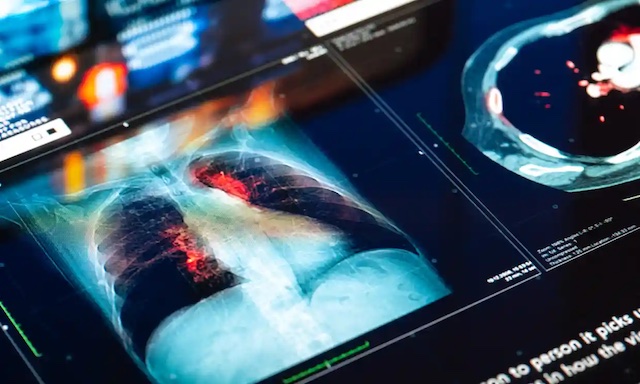
Residents are worried that, in addition to contamination from years of coal mining and byproducts in the area, nearby fracking projects such as this one will add further toxicity to the local water supplies and soil
Scientists find at least SIX toxins like arsenic and uranium in systems used by 95% of the US population
About 95 percent of the US population is drinking water from wells and community systems containing unsafe levels of toxic contaminants, a new study has revealed.
Scientists at the University of New Mexico identified at least six pollutants, primarily arsenic, nitrates, uranium and lead, linked to neurological and developmental problems.
Fracking fluids and PFAS were also detected in the drinking water that also flows to the homes of about 320 million Americans.
‘The seven contaminants and contaminant groups presented here represent a tiny fraction of the thousands of regulated and unregulated chemical agents present in drinking water,’… (Continue to full article)
 Thousands of workers leave the VA amid a flood of new cases and quota demands
Thousands of workers leave the VA amid a flood of new cases and quota demands
Claims processors with the Department of Veterans Affairs say they have strained to keep up with a flood of new cases brought on by the PACT Act and an existing quota system that pits their livelihoods against the veterans they signed up to help as a growing number of the processors leave the job.
The PACT Act expanded benefits to millions of veterans exposed to toxic substances when it was enacted in August of last year. But that has stressed the VA workers tasked with moving cases along amid a backlog, mandatory overtime, inadequate training and quota demands, according to two former claims processors and four current processors who spoke to NBC News on the condition of anonymity out of fear of retaliation.
Another employee said at least 25 new claims enter her queue each day, on top of the cases she did not get to the day before.
“It’s impossible. You’re falling in sand you can’t get out of.” … (Continue to full article)
Agent Orange Linked To Bladder Cancer, Hypothyroidism, Parkinson’s
More veterans may be included in compensation
 Originally published on this site on November 8, 2016. ~ Monsanto and Dow were 2 of the 9 wartime contractors hired by the US government to create Agent Orange, a combination of the toxic chemicals 2,4-D, and 2,4,5-T, just over 40 years ago. The damage these chemicals have perpetrated on our health and environment did not end with the Vietnam War though.
Originally published on this site on November 8, 2016. ~ Monsanto and Dow were 2 of the 9 wartime contractors hired by the US government to create Agent Orange, a combination of the toxic chemicals 2,4-D, and 2,4,5-T, just over 40 years ago. The damage these chemicals have perpetrated on our health and environment did not end with the Vietnam War though.
Aside from the long-term poisoning of soil and crops, a new review of Agent Orange research has found evidence that bladder cancer and hypothyroidism are more strongly linked to exposure to Agent Orange than was previously assumed. … (Continue to full article)
U.S. Gov. data confirms a 143,233% increase in Deadly Cancer cases due to COVID Vaccination
This Substack has been diligently chronicling the horrifying DEATHVAX™-induced turbo cancer phenomenon:
 From Turbo Cancer to Sudden Cardiac Mortality to Excess Non-Covid Natural Cause Mortality: The Never-Ending Adverse Events of the “Vaccinated” & The Global Depopulation Program
From Turbo Cancer to Sudden Cardiac Mortality to Excess Non-Covid Natural Cause Mortality: The Never-Ending Adverse Events of the “Vaccinated” & The Global Depopulation Program
Cancer begins when genetic changes interfere with the normal replication and replacement of cells in the body. Cells start to grow uncontrollably and may form a tumour. It is the No. 2 leading cause of death in the United States.
Unfortunately, it appears the disease may be on the rise thanks to the experimental Covid-19 injections. Because official U.S. Government data confirms the risk of developing cancer following Covid-19 vaccination increases by a shocking 143,233%n… (Continue to full article)
 Certain ‘forever chemicals‘ may raise the risk of one of the fastest growing cancers in America, a study suggests.
Certain ‘forever chemicals‘ may raise the risk of one of the fastest growing cancers in America, a study suggests.

 A professor emeritus of epidemiology in the Department of Epidemiology and Public Health at the Yale School of Public Health and the Yale School of Medicine is
A professor emeritus of epidemiology in the Department of Epidemiology and Public Health at the Yale School of Public Health and the Yale School of Medicine is 
 Multiple peer-reviewed papers suggest that
Multiple peer-reviewed papers suggest that 
 Thousands of workers leave the VA amid a flood of new cases and quota demands
Thousands of workers leave the VA amid a flood of new cases and quota demands
 From Turbo Cancer to Sudden Cardiac Mortality to Excess Non-Covid Natural Cause Mortality: The Never-Ending Adverse Events of the “Vaccinated” & The Global Depopulation Program
From Turbo Cancer to Sudden Cardiac Mortality to Excess Non-Covid Natural Cause Mortality: The Never-Ending Adverse Events of the “Vaccinated” & The Global Depopulation Program

 Could this initiative to sway opinion by leading cancer authorities possibly – just possibly – be related to the revolution that is happening around the world – highlighting the dangers and ineffectiveness of toxic chemotherapy and radiation, bringing cancer cures such as cannabis to the forefront, or the emerging mass markets now creating awareness on the reality of our food and the consequences of the cancer industry itself?
Could this initiative to sway opinion by leading cancer authorities possibly – just possibly – be related to the revolution that is happening around the world – highlighting the dangers and ineffectiveness of toxic chemotherapy and radiation, bringing cancer cures such as cannabis to the forefront, or the emerging mass markets now creating awareness on the reality of our food and the consequences of the cancer industry itself?  Amid ongoing vaccination efforts, Dr. Risch is professor emeritus of epidemiology in the Department of Epidemiology and Public Health at the Yale School of Public Health and Yale School of Medicine. His research has focused extensively on the causes of cancer as well as prevention and early diagnosis.
Amid ongoing vaccination efforts, Dr. Risch is professor emeritus of epidemiology in the Department of Epidemiology and Public Health at the Yale School of Public Health and Yale School of Medicine. His research has focused extensively on the causes of cancer as well as prevention and early diagnosis. 

 The turn of the 20th century promised to offer cures for every ailment with patented and colorfully packaged pills. Yet here we are. What happened? We were duped. More importantly, so were all of the well-meaning doctors, nurses, medical technicians, and scientists. There is a cancer within what we now know of as modern medicine – eating away at the very heart of its original design. Rather than saving and healing humanity, this cancer seeks to destroy us from within.
The turn of the 20th century promised to offer cures for every ailment with patented and colorfully packaged pills. Yet here we are. What happened? We were duped. More importantly, so were all of the well-meaning doctors, nurses, medical technicians, and scientists. There is a cancer within what we now know of as modern medicine – eating away at the very heart of its original design. Rather than saving and healing humanity, this cancer seeks to destroy us from within.